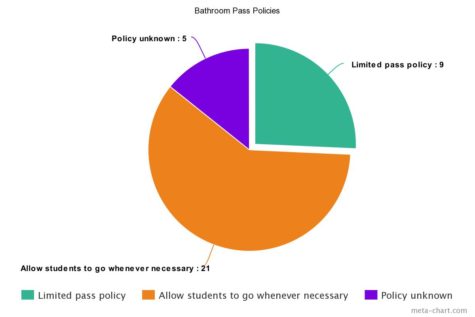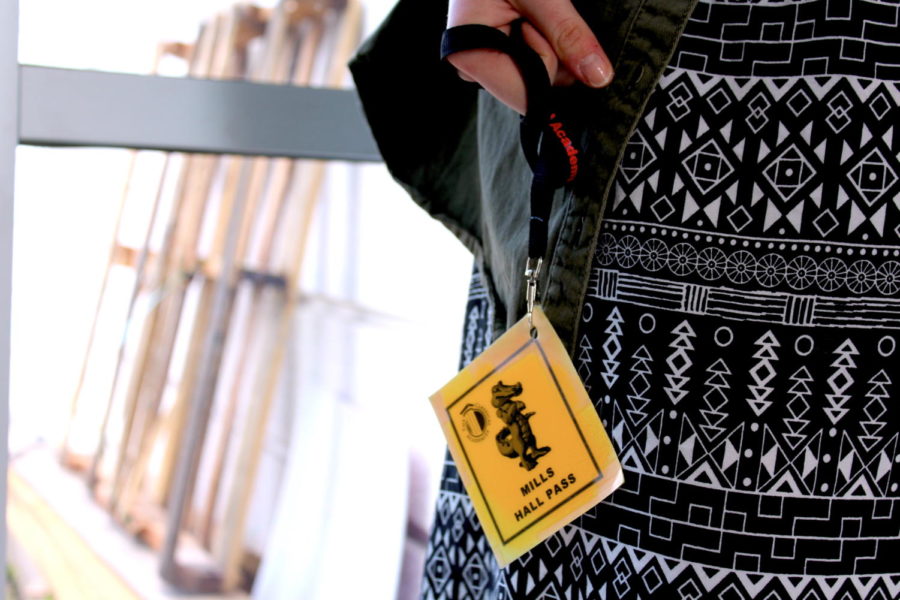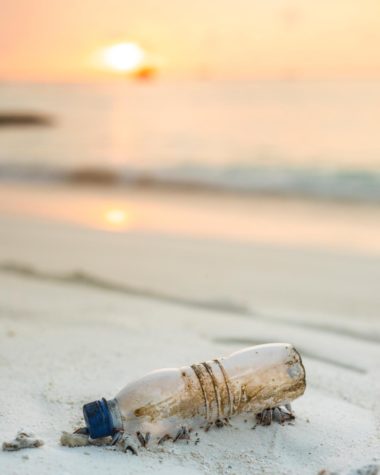Concerning CAHS Bathroom Pass Policies
On occasion, the stars will align both cruelly and perfectly: the difference between a letter grade in a class is just a few points. For some, this is not a problem; their grade will be bumped up thanks to the extra credit they received from not using their allotted bathroom passes for that semester. For others, that grade will remain at 89 percent because those students were unable to “plan correctly” and had to use the restroom during class time.
If one is drinking the recommended half-gallon of water per day, odds are that the need to use the restroom will strike unexpectedly. Even if students use the restroom during every passing period and during lunch (as I do), there are times when it’s necessary to go during class. However, with the promise of extra credit hanging over my head, I am loath to do so, out of fear that I may need the extra credit in the future.
Mr. Christian Sheffield, who teaches AP Language, AP Psychology and Pre-AP English, is one of several teachers who enforce the limited-passes-for-extra-credit policy. While he has experimented with allowing students to use the restroom without limited passes, he stands by his current policy.
“Unfortunately, every time that I’ve gotten rid of a bathroom pass, it has led to a train of people using the bathroom one after another; they’re basically handing the pass off to each other, and I don’t believe that every single one of them really has to go … They miss instructions that I have to repeat just because they don’t want to be in the classroom for five minutes.”
While it is true that some students may use the restroom more often and “hand the pass off to each other,” this is a necessary evil. Those who actually have to use the restroom should not be punished for the mistakes of a few, especially when health and well-being is on the line. Holding urine for too long is a health hazard and can have long-term effects if done over a prolonged period of time. This includes the weakening of bladder muscles, as well as the potential of exposing your body to harmful bacteria (sciencealert.com).
Sheffield sums up the wishes of many teachers perfectly: that teachers “could just trust the kids to only use the restroom when they really had to, and to plan their days out appropriately, and make sure that they’re using the restroom during passing periods, lunch, before school or after school.”
In a perfect world, this would be the case. However, for this to be possible, the bathrooms would always have to be stocked and in working order in order to accommodate the high volume of people who need to use the restroom during breaks.
Most of the time, only a few stalls in any given (girls’) bathroom are functional, which increases waiting time exponentially. Furthermore, soap and paper towels are frequently depleted, which causes both frustrations and health issues. In fact, the soap dispensers in all the girls’ bathrooms on the first story were empty for two weeks — during the height of flu season. This only increased opportunities for students to get sick at school; many health experts encourage us to help stop the spread of germs by washing our hands, but it’s impossible to wash our hands if we have no soap to wash them with.
Unfortunately, the world is an imperfect place, and there will always be students abusing bathroom privileges. However, as one of the students who uses bathroom privileges responsibly, it would be a great relief to stop stressing out about whether I am “allowed” to make a mad, calculated dash out of first period so I don’t pee my pants.
Principal Dana Moen stated that his main concern was the safety of the students who left class to use the bathroom, explaining why teachers are worried about abuse of the passes.
“The teachers notice it because,” sometimes, Moen says, “people get in trouble when they go to the bathroom.” Some students have used supposed bathroom trips as cover-ups for other activities. This can create a dilemma for a teacher who wants to trust students, but is still legally obligated to protect them — something a teacher can’t always do if students are sneaking out of class. “The teacher finds out later … then it’s on the teacher to keep that kid safe.”
Mr. Moen also cited drug use, stating that drug deals have been carried out in school bathrooms in the past. Still, Mr. Moen stated he was open to teachers creating their own restroom policies that reflected the needs of their classroom: “I just think that teachers are smart; they’re brilliant [and] they’re creative. I like them setting the tone and being able to come up with their own policies for the class.”
When Assistant Principal Mrs. Debbie Lieber was asked for her take on this issue, she declined to comment.
This issue is not limited to CAHS. Sophomore Katelyn Banderob of Escondido High School has issues with similar policies at her school. Banderob’s school has only three girls’ restrooms which collectively have 10 stalls total, resulting in a line of 20 to 25 people during passing periods. Nevertheless, Banderob is limited to two to three passes per class per semester, creating an even greater dilemma.
“Some people work really really hard to pass their classes, and others just get extra credit by simply not using the restroom,” Banderob said. “I know people who are barely not passing a class, and, when they turn their passes in that they didn’t use, suddenly they are passing.”
If the extra credit system was not in place, perhaps students would not risk being uncomfortable for an entire class period — or in Banderob’s case, an entire school day — in order to boost their grade by a few percentage points.
Limiting bathroom passes results in gender inequality as well, due to the fact that people who get periods will need to use the restroom more often. Unfortunately, menstrual cycles involve blood, and, when you’re on your period, there is the possibility that you’ll have to leave the class multiple times per period (no pun intended) in order to change your pad or tampon to safeguard against various bacterial infections (for example, UTIs) that can occur with a lack of menstrual hygiene. Actual menstruation will last an average of four to seven days, and require multiple pad and tampon changes throughout the day. So, over the course of one menstrual cycle — which typically lasts anywhere from four to eight weeks — you’re looking at way more than just three bathroom trips per 18-week semester, three trips being the amount granted by most teachers who use the limited-pass system.
As for the dilemma of missing teacher instructions, that is the students’ responsibility. In almost every case, using the restroom takes no more than five minutes, and students are capable of deciding when is an appropriate time to go. In the professional world many of us will soon enter after high school, it is not necessary, and in fact frowned upon, to ask one’s boss whether or not you can use the restroom. Instead, it is expected that employees will go when appropriate, and bring themselves up to date on their own time.

However, among the stars that decide the fate of both your bladder and your grade, there is a shining solution that Chemistry teacher Ms. Lauren Leyva has already implemented: a sign-in/sign-out sheet. If students were required to sign out and in before and after using the restroom, teachers would be able to track how many times and for how long each student is gone each week. If the number of trips to the bathroom exceeds a certain amount, then further investigations could be conducted.
Additionally, as Mr. Michael McGaugh and Mr. Brian Peet do, there is the option of making students leave their phone when they use the restroom, in order to eliminate distractions and ensure that students are going because they actually need to.
It is strongly recommended that teachers reconsider their bathroom pass systems with these concerns in mind in order to maintain the best of both worlds for both learning and health. It is only reasonable that we should be allowed to take on the responsibility for our own restroom-related needs.












Katelyn Banderob • Apr 22, 2018 at 9:45 pm
LOVE THE ARTICLE SO MUCH! I think you could make a difference in people. You are a great writer and I am so happy I could help❤️❤️